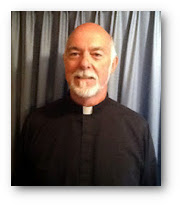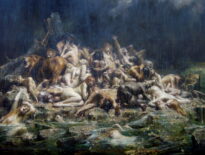
Father Perry D. Leiker, pastor.
+ “Once upon a time …” is how many stories and fables begin.
It probably evokes in the reader a sense of fantasy and mystery, and almost timelessness.
But not so in this book of Genesis.
The writer tells this fantastical story of God destroying everything and everyone — except for a tiny few of each animal, and Noah and his family.
But then, perhaps to give it a historical quality — and to root it all in a specific time — we are told that these things happened “in the six-hundred-and-first year of Noah’s life, in the first month, on the first day of the month …”
Whoa! Really? Did the writer of Genesis momentarily lose it and multiply everything by 100 times?
What is going on here?

Adam, with Eve.
Well, especially in Genesis, we find many persons with huge lifespans like: “Adam — 930 years; Seth — 912 years; Enoch — 905 years; Cainan — 912 years; Mahalalel — 895 years, etc.
And there are many, many more such examples.
Is this for real? Did they actually live that long?
Is this just to say that their lives were important and that Adam and Eve — who were created to live forever — lost that among the many gifts and found their lives finite.
In other words, they died.
(Why did you have to eat the apple?!)

Enoch.
Well, everyone has to figure this one out themselves — sorry.
I, for one, just do not believe the data here. An interesting, if not amusing article, talks about biblical lifespans.
(Who knows if any of this is fact or perspective or conjecture or just fun, but I will give you the reference then for fun: https://answersingenesis.org/bible-timeline/genealogy/did-adam-and-noah-really-live-over-900-years/.)
But one last item must be mentioned. Did God change his mind?
Did God learn something new and make a promise to himself to never do such a thing that just maybe could make him regret his choice, like kill almost everyone and everything on the earth?
And did God show weakness by admitting that this extreme decision on his part was, if not a mistake, at least not something he would ever wish to do again — “I promise!”

Seth.
What an interesting story, indeed. And maybe in its extreme presentation of sin and renewal and washing clean, and reproducing the good and showing just how powerful is this God, just maybe one would never be provoked to do anything like this extreme in their futures.
Like, maybe, man would never produce anything like a nuclear bomb with hell-like possible destruction.
Or, maybe there could never be such a thing that we would call the Holocaust. Right?
Is this story, perhaps, a mirror into which we look at a God who could destroy the earth so that we could never see humans who could destroy earth and civilization, and in fact, have done so?
I wonder.

Cainan.
And then, just how appropriate is it that such an interesting miracle should take place at the hands of Jesus?
It is the only miracle, some would say, in which healing takes place gradually, or in stages.
Jesus laid hands on the man and asked if he could see; the man responded: “I see people looking like trees and walking.”
And so Jesus lays hands a “second time,” asking again what this man could see and he responds in a triplicate form that: “he saw clearly; his sight was restored and he could see everything distinctly.”
Was this, at least, a little odd kind of response? Did he really have to respond three times?
Yes! Of course! Perfectly! Smart writing, indeed.

Mahalalel.



